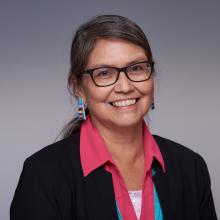COVID-19 has killed Native Americans at twice the rate of White Americans, underscoring the health inequities and deep-rooted distrust tribal nations have of federal government entities.
And yet, Native Americans have the highest vaccination rates of any major racial or ethnic group in the United States. Like many other tribal nations, the Navajo had to embrace Western science to reclaim its social customs and ceremonies. “We’re a very social culture, so having to isolate really impacted our mental health,” said Mary Hasbah Roessel, MD, DLFAPA, a Navajo psychiatrist who is affiliated with Santa Fe Indian Hospital in New Mexico.
The Navajo nation occupies the largest Native American reservation in the United States, spanning New Mexico, Arizona, and Utah. As of mid-October, the nation had reported more than 34,000 COVID-19 cases and 1,400 deaths in its jurisdiction.
In an interview with this news organization, Dr. Roessel described the partnerships that mobilized a nation of more than 250,000 individuals to get vaccinated.
Question: Why has the death rate been so high in the Navajo nation?
Answer: A lot of health disparities before the pandemic were blatantly revealed during COVID. Only 40% of people on the reservation had running water. Having to stay home and isolate led to food insecurity. Further insecurity issues affected our ability to stay healthy, such as having good sanitation. There’s a lot of poverty, a high unemployment rate. Some people had to go to work off reservation and were potentially bringing the virus home. A lot of generations live in the same household. Elders were vulnerable to getting the infection, and there was little ability to isolate if someone wasn’t having symptoms. Hospitals nearby didn’t have ICUs.
Therefore, the rate of cases skyrocketed early on. We were disproportionately affected. The Navajo nation per capita had the highest rate of cases in any state.
Q: What changes took place within the Navajo nation to get people vaccinated? What role did the federal Indian Health Service have in promoting this?
A: There had to be a shift in acceptance of the vaccinations.
With the IHS, we went into a disaster response mode with all-hands-on deck meetings. We had to figure out how we could access mass vaccination clinics. Partnering with the Navajo Department of Health, we did that right away with hospitals and small clinics across the Navajo nation. Casinos owned by tribal entities that closed during COVID reopened and were used as vaccination clinics.
Vaccinations were sent to us fairly quickly. I ended up getting vaccinated in December 2020, when it was first rolled out.
Native and Navajo individuals have been reluctant to rely on government services. Because IHS came through with the vaccines, COVID reduced that stigma to access its services. Even the Navajo Department of Health partnered with the Indian Health Service to provide culturally relevant campaigns that explain why the vaccine is valuable.
I think because people were so impacted, they saw something valuable with the vaccine. Given the education and access, people were ready to get vaccinated. They realized if a whole household got vaccinated, they could see early on that they could be social again.


